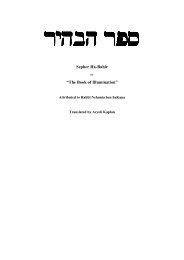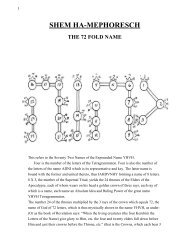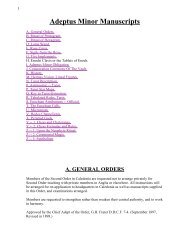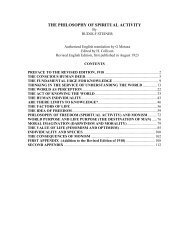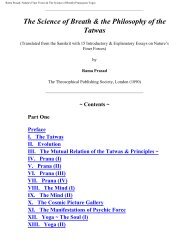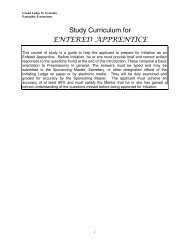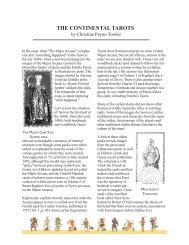Band 2 Anthropogenesis - H.P. Blavatsky
Band 2 Anthropogenesis - H.P. Blavatsky
Band 2 Anthropogenesis - H.P. Blavatsky
You also want an ePaper? Increase the reach of your titles
YUMPU automatically turns print PDFs into web optimized ePapers that Google loves.
that she must travel eastward, after passing the "Kimmerian Bosphorus," and cross what is evidently the Volga and now<br />
Astrakhan on the Caspian Sea. After this she will encounter "fierce northern blasts" and cross thither to the land of the<br />
"Arimaspian host" (east of Herodotus' Scythia) to --<br />
"Pluto's gold-abounding flood. . . ."(825)<br />
Which is rightly conjectured by Professor Newman to have meant the<br />
[[Footnote(s)]] -------------------------------------------------<br />
* It is complained by the author of the version on, and translator of, "Prometheus Bound" that in this tracing of Io's<br />
wanderings, "no consistency with our known geography is attainable" (p. 191, Vol. II). There may be good reason for it.<br />
First of all it is the journey and wandering from place to place of the race from which the "tenth," or Kalki Avatar, so called,<br />
is to issue. This he calls the "Kingly race born in Argos" (888). But Argos has no reference here to Argos in Greece. It<br />
comes from Arg or arca -- the female generative power symbolised in the moon -- the navi-formed Argha of the mysteries,<br />
meaning the Queen of Heaven. Eustathius shows that, in the dialect of the Arg-ians, Io signified the moon; while<br />
esotericism explains it as the divine Androgyne, or the mystic 10; in Hebrew 10 is the perfect number, or Jehovah. Arghya<br />
in Sanskrit is the libation cup, the navi-form or boat-shaped vessel in which flowers and fruit are offered to the deities.<br />
Arghyanath is a title of the Maha-Chohan, meaning "the Lord of Libations;" and Arghya Varsha -- "the land of libations" --<br />
is the mystery name of that region which extends from Kailas mountain nearly to the Schamo Desert -- from within which<br />
the Kalki Avatar is expected. The Airyana-Varsedya of the Zoroastrians, as a locality, is identical with it. It is now said to<br />
have been situated between the sea of Aral, Baltistan, and little Tibet; but in olden times its area was far larger, as it was<br />
the birth-place of physical humanity, of which Io is the mother and symbol.<br />
------------------------------------------------------------------------<br />
[[Vol. 2, Page]] 417 THE MISTAKE OF ARRIAN EXPLAINED.<br />
Ural, the Arimaspi of Herodotus being "the recognised inhabitants of this golden region."<br />
And here comes, between verses 825 and 835, a puzzle to all the European interpreters. Says the Titan:--<br />
"To these (Arimaspi and Grypes) approach not; a far border land<br />
Thou next wilt reach, where dwells a swarthy race<br />
Near the Sun's founts, where is the AEthiop "river";<br />
Along its banks proceed till thou attain<br />
The mighty rapids, where from Bybline heights<br />
Pure draughts of sacred water Neilos sends . . . "<br />
There Io was ordained to found a colony for herself and sons. Now we must see how the passage is interpreted. As Io is<br />
told that she has to travel eastward till she comes to the river Ethiops, which she is to follow till it falls into the Nile --<br />
hence the perplexity. "According to the geographical theories of the earliest Greeks" we are informed by the author of the<br />
version on "Prometheus Bound" --<br />
"This condition was fulfilled by the river Indus. Arrian (vi. i.) mentions that Alexander the Great, when preparing to sail<br />
down the Indus (having seen crocodiles in the river Indus, and in no other river except the Nile . . . ), seemed to himself to<br />
have discovered the sources of the Nile, as though the Nile, rising from some place in India, and flowing through much<br />
desert land, and thereby losing its name Indus, next . . . flowed through inhabited land, being now called the Nile by the<br />
Ethiopians of those parts and afterwards by the Egyptians. Virgil in the 4th Georgic echoes the absolute error" (p. 197,<br />
Vol. II.).<br />
Both Alexander and Virgil may have erred considerably in their geographical notions; but the prophecy of Prometheus<br />
has not so sinned, in the least -- not, at any rate, in its esoteric spirit. When a certain race is symbolised, and events<br />
pertaining to its history are rendered allegorically, no topographical accuracy ought to be expected in the itinerary traced<br />
for its personification. Yet it so happens, that the river "Ethiops" is certainly the Indus, and it is also the Nil or Nila. It is the<br />
river born on the Kailas (heaven) mountain, the mansion of the gods -- 22,000 feet above the level of the sea. It was the<br />
Ethiops river -- and was so called by the Greeks, long before the days of Alexander, because its banks, from Attock down<br />
to Sind, were peopled by tribes generally referred to as the Eastern Ethiopians. India and Egypt were two kindred nations,<br />
and the Eastern Ethiopians -- the mighty builders -- have come from India, as is pretty well proved, it is hoped, in "ISIS<br />
UNVEILED." (Vol. I. p. 569-70).<br />
Then why could not Alexander, and even the learned Virgil have used the word Nile or Neilos when speaking of the<br />
Indus, since it is one of its names? To this day that river is called, in the regions around Kala-Bagh, nil (blue), and Nilah,<br />
"the blue river." The water here is of such dark blue colour that the name given to it from time immemorial led to<br />
------------------------------------------------------------------------<br />
[[Vol. 2, Page]] 418 THE SECRET DOCTRINE.<br />
a small town on its banks being called by the same name. It exists to this day. Evidently Arrian -- who wrote far later than<br />
the day of Alexander, and who was ignorant of the old name of the Indus -- has unconsciously slandered the Greek<br />
conqueror. Nor are our modern historians much wiser, in judging as they do. For they often make the most sweeping<br />
declarations on mere appearances, as much as their ancient colleagues ever did in days of old, when no Encyclopaedias<br />
were yet ready for them.<br />
The race of IO, "the cow-horned maid" is then simply the first pioneer race of the AEthiopians brought by her from the<br />
Indus to the Nile (which received its name in memory of the mother river of the colonists from India*). For does not<br />
Prometheus say to Io** that the sacred Neilos (the god, not the river) --




